
painting by Charles Moone, 2005
For those who follow the ebb and flow of history, the 2016 election came to a predictable end, though many of us were too close to see it coming.
But some of what happens next is also predicable, and therefore we can harken to our history books for answers, and try to map an end run around the things we can predict with surety.
These events include:
-Climate change disrupting everything from the economy to political borders, food security, water distribution, and generating even more massive migrations of people and humanitarian crises. Nothing on land or at sea will be untouched.
-Racism, xenophobia, hate crimes, and attacks on civil liberties will become more overt.
-Agent provocateurs will mix the message.
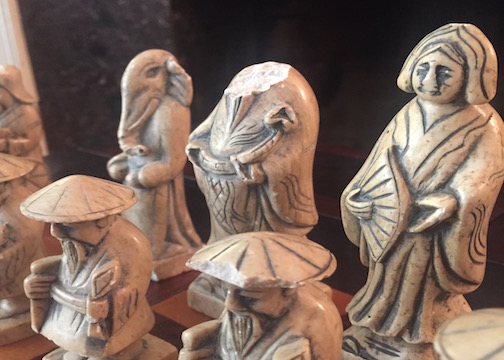
So we have to respond accordingly.
If Washington under Trump is going to gut environmental protections, we have to gut the businesses who will profit. We have to make it materially irrelevant that environmental agencies are weak, or that the Paris Agreement will get tossed out the window.
If the Affordable Care Act is dismantled, we have to look for alternatives in the form of radical medical access. Can we do that? I have no idea. But we have to spitball any and all ideas, and then approach the industries and interests who can implement change.
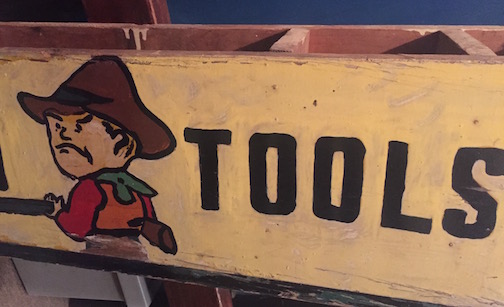
If “news agencies” promote false narratives and hateful rhetoric, we have to hit their advertisers where they live. Dig into how web advertising works, create counter-narratives. Create campaigns to pull money from companies that thrive in the toxic stew. Corporations can’t have it both ways: freedom of “speech” in the form of lobbying and SuperPACs but freedom from prosecution or consequences when their speech is filled with hate and irresponsibility and blithe indifference.
And if we can’t get change from the inside, we have to make it financially difficult for them to function. Continue hitting big oil where they live. Agribusiness is a huge polluter and inefficient consumer of resources; we have to radicalize food production. Find the hidden uses of fossil fuels (fertilizer is an example) and make them irrelevant by shifting funding into their alternatives.
Move money on massive scales. Take stocks out of huge portfolios. Go to universities and demand they pull assets away from toxic businesses. Ask Apple to take its billions of dollars in the bank and start financing clean water tech, solar roads, investment in the infrastructure of Standing Rock and other Native American lands. They need to diversify; let’s make it sexy to do so in the areas we’re concerned about. Where’s George Soros? Let’s get him on board for direct action. Is JK Rowling free?
There are organizations who already address these issues. I’ve donated to many of them. Some of you work for them. We can volunteer with them.
But I also know that the smartest guys in the room often aren’t guys and aren’t anywhere near the room. We need to pull together this amazing brain trust and figure out new paths.
Let’s make everything we hold dear financially imperative to those with the fattest pockets and longest reach.
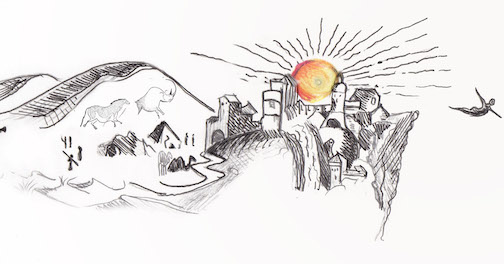
These are massive actions, and the size of them can make us feel tiny, especially when staring up at the enormous Cyclops that just beat us over the head with a mammoth’s leg bone. But revolutions come in all sizes, and there are small ways that add up to large ones if enough people participate.
- We’ve learned convenience trumps everything in the United States. So let’s create stores that sell nothing but bulk goods and generate virtually no waste.
Eradicate superfluous packaging, which hits the bottom line in all kinds of industries: fossil fuels, plastic production, mining, toxic chemical production, landfill, groundwater and ocean pollution, logging and paper milling, and lastly, recycling—which is better than not doing it, but still is woefully inefficient.
Let’s create neighborhood-bulk-programs where major goods and staples are purchased in shares: oil, toilet paper, soap. Once a year a barrel of maple syrup shows up and we divide it between the owners of the share; money goes directly to the producers of the maple syrup, and there’s no packaging, a re-useable barrel, and no store at all. A truck (or cargo bike!) delivers your neighborhood’s wine or oil; bring your jugs and fill them them ROMAN STYLE!
Yes, we can all shop at the co-ops and farmers’ markets, but it’s inconvenient for most people. Bulk sections are a decent start, but I want bulk everything, from oil to beer, crackers to ice cream. We can scoop stuff into tiffin carriers, pre-weighed aluminum storage, or cotton bags.
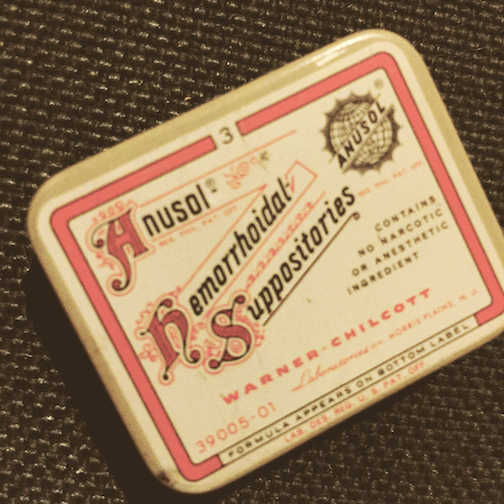
- The “beauty and hygiene” market is one I’ve dramatically toned down in my house. I use bamboo toothbrushes, homemade skin products. Things that aren’t packaged, like bars of soap. For lotion, I refill a jar with coconut oil once every couple of months. Oil and baking soda toothpaste? Sounds freaky, but not nearly as freaky as all the crap in your Colgate, not to mention the tube which ends up as landfill.
And whatever crazy health benefits touted about using a wooden comb doesn’t matter to me nearly as much as the fact that it will decompose. I use an old-style safety razor. (“Safety” is a misnomer: the first time I shaved I nicked myself pretty good; my husband practically removed all the skin from his scalp the first time he used one, and we decided he wasn’t “exfoliating” as much as “defoliating.” But a minor flaying is totally worth it if it means no more disposable razors end up in the Pacific Garbage Patch.)
Ban anything with micro-beads, antibacterial soap, triclosan. Decide how much you need another wrinkle cream that probably works as poorly as the last one you bought, and surely has hidden ingredients that are finding their way into groundwater, the food chain, and soil, not to mention YOU.
- Withdraw from junk clothing.
The fashion industry is one of the worst polluters in the world, (it’s second only to the fossil fuel industry) and has a shady track record of human and worker rights, so removing both my cash and my clothing out of the consumer waste stream is fairly satisfying on the “righteousness” scale. I recently bought second-hand a cheap, almost-new cashmere sweater (not crappy cashmere, either–a really soft, tight weave that is cooking me to death as I write this); a couple of men’s button-up shirts with hoity-toity labels; two women’s tees in a Breton stripe, and a silk “Theory” brand camisole. (I just looked up how much the Theory camisole cost new: well over two hundred bones; I got it for 7 bucks.)
Cruise your local vintage stores when you need something. Trawling the aisles of Goodwill makes you both financially practical and surrounds you with people from everywhere. I love it there. My son loves it there. Adjust your mental space to frugality and economy, re-use and living lightly.
Re-shape your idea of classy: is it classy to wear trendy clothing that pollutes groundwater and relies on cheap labor in horrid conditions? No, it’s classy to buy a piece of well-made clothing that isn’t cheap in either price or quality, and wearing it until it falls apart. It’s classy to buy a well-made bag you love, taking good care of it, using it until you’re sick of it, and then giving it to someone else who needs it more than you. You might not have a huge wardrobe, but you’ll be classy and timeless, I guarantee it.
This is not a quick way to shop. But I look at it like being a hunter-gatherer: most of the time you find tubers and bugs to eat (nutritious, sure, but where’s the flavor?). But sometimes you’ll nab a whole bison and a bunch of ripe strawberries for your efforts, and you’ll appreciate them ever the more. The net effect is that your style is absolutely yours and yours alone, which, in an era of Kardash-fash, cheap labor, and processes that poison both humans and the wildlife around us, is something to make you proud.

- Laziness is actually good environmental practice: leaving leaves on the ground creates a habitat so that birds and critters have all the necessary components for hanging out through the winter: food for worms. Worms for birds. Birds for seed delivery and insect control. Happy toad homes. Natural compost.
Do our neighbors think we’re lazy? Probably. And we are. BUT WE’RE A BENIGN LAZY.
Xeriscape. Naturalize. Plant natives in your yard. Plant a meadow. Loan your yard to people who want to grow things but have no yard of their own. Reclaim your land, whatever it looks like: a balcony, a deck, your basement window. Trade bulbs with your neighbors. Plant a freaking civil-rights-loving Victory Garden and give the bounty to charitable causes.
- Stop buying landfill.
Think about whether that damned Schmørff table at the SwedishSøøperSenter is going to end up in the garbage in a few years (Yes). Look for alternatives to the often abhorrently toxic particle board and MDF. Buy off Craigslist. Our kitchen island is from the ReBuilding Center, a charitable organization that pulls architectural elements out of the waste stream. Our kitchen tile came from a company that recycles old porcelain and glass and makes new tile. Use reclaimed wood. Refinish old pieces.
It’s taken our family years to come out looking slightly more mature than college dormers, but we have little in the way of future landfill furniture.
If you’re buying new, save up and buy products from crafty people that are built to last; I got an absurdly well-made bag which will outlast me by decades; I hope my grand-kids will use it for books in college.
Cruise thrift stores for pots, pans, utensils. There’s always a nice collection of mason jars at the one I go to. I kitted out our camping gear with used kitchen-wares. Not sure you need that gewgaw or frippery? Look for it in charitable tag sales first.
Always look at the object in your hand and ask yourself, “Is this thing likely to end up in the gullet of a sea bird, the bottom of the junk piles in my basement, or as a broken piece of plastic cultural detritus in the landfill?” If the answer is “yes,” don’t buy it unless you really need it. (I still can’t figure out how to get my prescription refilled in anything but that annoying one-use non-recyclable amber bottle. I HATE IT.)
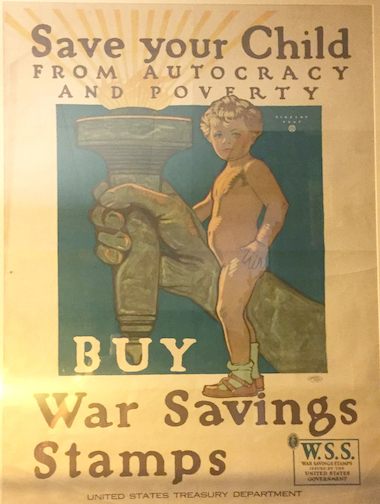
- Teach kids to see the world, including the harsh parts.
This one is brutal. Our job as parents and educators is to get our kids to adulthood feeling confident and strong, right? But the realities are not always pretty. So with our own son, we watch the news. We talk about sexism. We talk about racism. We talk about class. We talk about climate change. We talk about pollution. We try to answer questions honestly–which sometimes means we have to explain really rotten truths–and to admit that we don’t have answers, and then encourage him to seek them out.
We also try, as best we can, to provide him with the tools to evaluate the media, to question the messages it’s often very difficult to filter out. If he can’t filter out the noise, we hope that at least he can see things from a variety of positions, and that there is rarely one clear path to a solution.
In an age when the humanities are considered superfluous, and schools have been hamstrung by hypersensitivity, I suspect this might be the best thing we are doing to better the world. If we encourage our children to be critical thinkers rather than consumers of junk narratives and sloppy journalism, to be conservative in their consumption of resources, but generous with their time and their concern, we have one more bit of hope for our collective future.
These are brainstorms. Some of them might be viable, some of them not. But we’ll come up with others and implement them. We’ll be the think-tank that finds interesting solutions to these profound problems. We’re not doing it all today, but every day and with tenacity.
Is this idealistic? Yes. But I can’t be motivated only by fear. I have to be motivated by hope and belief in our better angels. And you are our better angels.



I read your article carefully, it helped me a lot, I hope to see more related articles in the future. thanks for sharing.